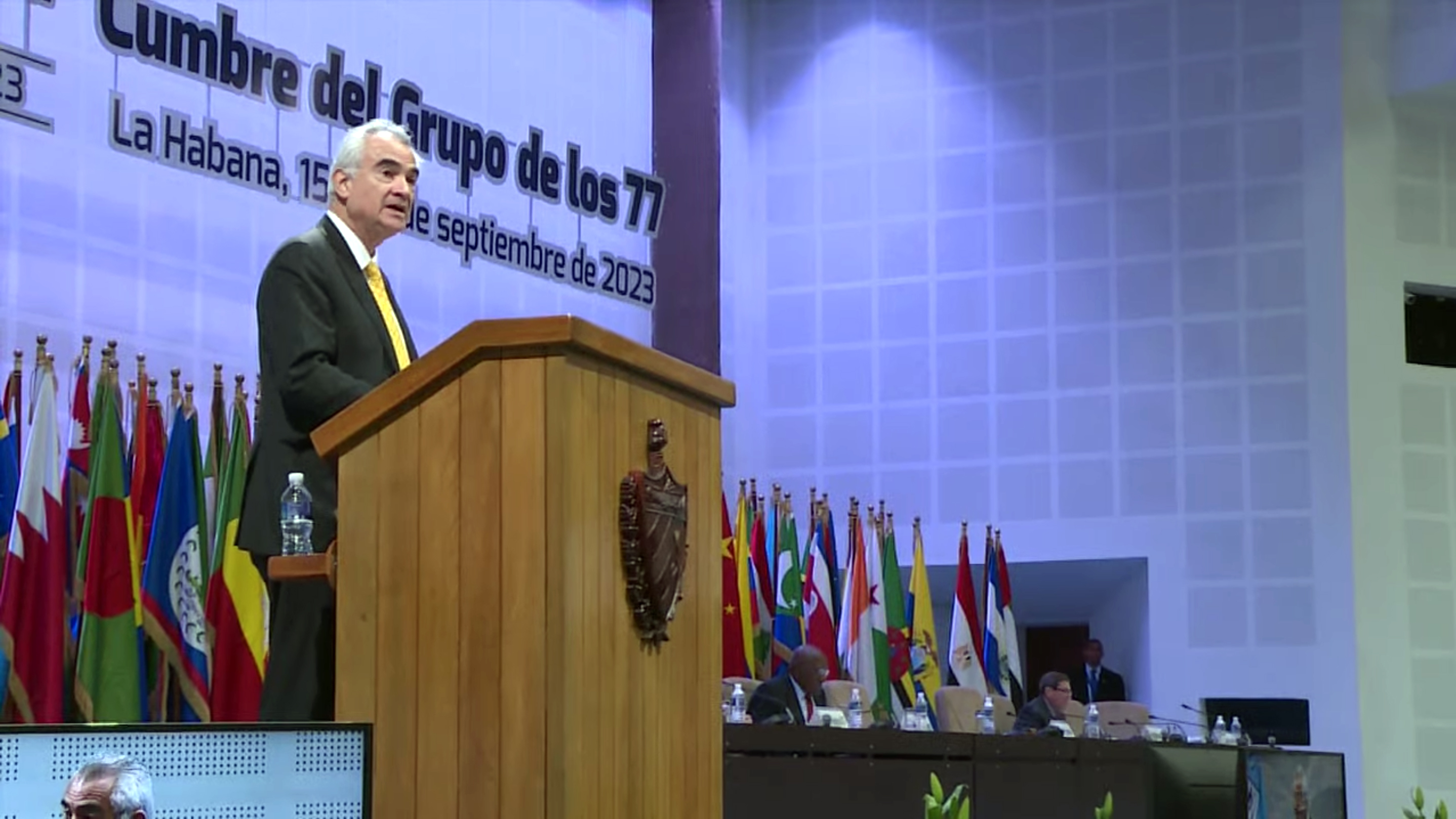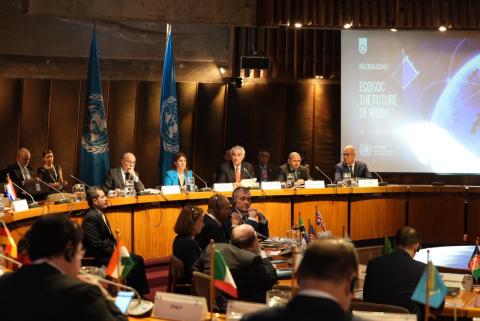Press Release
The Executive Secretary of the Economic Commission for Latin America and the Caribbean (ECLAC), José Manuel Salazar-Xirinachs, spoke today at the plenary session of the G-77 and China Summit, which is being held on 15 and 16 September in Havana, Cuba. He highlighted the importance of regional cooperation and multilateralism to take on the challenges facing humanity—especially climate change—and promote new policies of sustainable and inclusive productive development that allow countries in the Global South to develop their technological and innovation capacities.
The G-77 and China Summit: “Current Development Challenges: the Role of Science, Technology, and Innovation” is being attended by some thirty heads of state and more than one hundred delegations. This group is currently the largest forum for dialogue and discussion within the framework of the United Nations and brings together all of Latin America and the Caribbean—except Mexico—and Africa, the Middle East, and most of Asia (without Russia’s participation). It is currently made up of 134 countries, with 80% of the world’s population and two thirds of UN members.
The meeting was inaugurated by the President of the Republic of Cuba, Miguel Díaz-Canel Bermúdez, and the Secretary General of the United Nations, António Guterres.
The Executive Secretary of ECLAC delivered a speech on behalf of the five United Nations Regional Commissions, whose member countries include most countries in the Global South. In his speech, he noted that humanity is facing the existential challenge of climate change. “It is in our hands to take action, leverage opportunities and maximise the benefits of nascent technologies to build resiliency in our countries and economies, as well as to reduce negative impacts. In addition, it is more important now than ever to promote new policies of sustainable and inclusive productive development that allow countries in the Global South to develop their technological and innovation capacities”, he stated.
“In this context, multilateralism can make a significant difference by creating norms and frameworks for international cooperation. However, the risks of growing polarization make it more difficult to reach global consensus. The good news is that, at the regional level, there are many opportunities for multilateral cooperation. The Regional Commissions are unique and inclusive intergovernmental platforms for analysing challenges, identifying solutions and taking joint action to promote implementation of the 2030 Agenda for Sustainable Development”, he emphasized.
José Manuel Salazar-Xirinachs explained that in order to overcome the trap of low economic growth and accelerate progress toward the Sustainable Development Goals (SDGs), ECLAC has proposed a series of driving or invigorating sectors for productive and technological transformation that countries and their territories could prioritise through policies of productive development. Chief among these are energy transition, digital transformation, sustainable agriculture and the bioeconomy, modern services trade, care society, the circular economy and the pharmaceutical and medical device industries.
He added that in the current world context, “invigorating the regional economy is a fundamental challenge in a region that grew only 0.8% annually in the last decade, less than the 2% growth of the famous lost decade of the 1980s”.
The Executive Secretary of ECLAC stated that for middle-income countries like those in Latin America and the Caribbean, graduation has had adverse effects on concessional financial support and on opportunities for international cooperation. “The reality, as documented in our recently published Economic Survey, is that the debt service cost for countries in Latin America and the Caribbean has grown very significantly, causing a serious reduction in fiscal space in a majority of countries for investment in accelerating SDGs and for science, technology, and innovation”, he said.
“(UN) Secretary General António Guterres’s call to reform the international financial architecture is a great opportunity for collaboration between the G-77 members and the Regional Commissions to achieve a more adequate financial system, and this will certainly be another important debate leading up to the Summit of the Future”, Salazar-Xirinachs highlighted.
Finally, he stated that the G-77 and China Summit is an example of multilateralism in action. “ECLAC, along with the other Regional Commissions, are fully committed to supporting the G-77 and China and to the 2030 Agenda goals,” he affirmed.
During his visit to Cuba, the Executive Secretary of ECLAC also held important bilateral meetings with senior authorities of the Cuban government. He met with Ricardo Cabrisas Ruiz, Vice Prime Minister of the Republic of Cuba and Minister of Foreign Trade; and with Alejandro Gil Fernández, Vice Prime Minister and Minister of Economy and Planning. The working relationships between both parties were reaffirmed in these meetings, in which priorities were evaluated for the Cuban and regional economies, as well as the complex challenges they face. Salazar-Xirinachs reasserted the organisation’s commitment to the Caribbean country and recognised Cuba’s role in the region and its experience in South-South cooperation. For their part, the Cuban authorities expressed appreciation for the cooperation and support provided by ECLAC and underscored the country’s commitment to the organisation, the multilateral system and the implementation of the 2030 Agenda for Sustainable Development.



